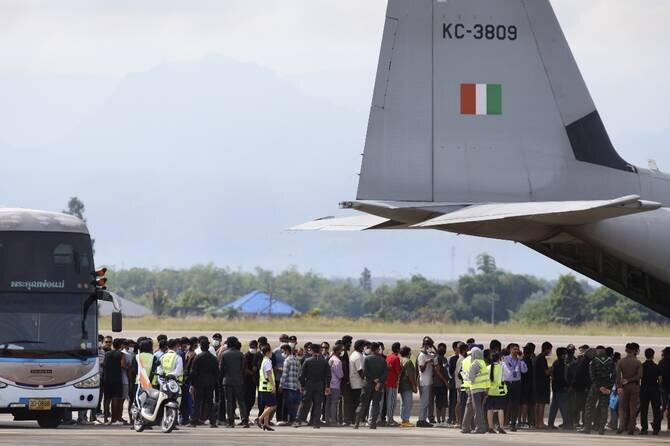
Myanmar Junta Demolishes Nearly 150 Scam Hub Buildings Amid Crackdown
The military regime in Myanmar is demolishing nearly 150 buildings that served as notorious internet scam hubs, including luxury amenities and criminal boss offices.
YANGON: The military government of Myanmar announced on Sunday its intention to demolish almost 150 buildings associated with an internet scam operation along the border with Thailand.
These structures reportedly housed a variety of facilities such as a gymnasium, spa, and karaoke bar.
The fraudulent activities taking place in these loosely regulated border areas have significantly proliferated within Myanmar's conflict-torn regions.
The fraud networks, which primarily target unsuspecting internet users through romance and business scams, are estimated to generate tens of billions of dollars annually.
Many individuals, some of whom are trafficked into these scam operations, work under the guise of legitimate internet businesses.
These facilities often boast luxurious amenities catered towards the high-earning scammers and their criminal overlords.
In a recent crackdown, Myanmar's military forces raided the infamous KK Park scam center last month.
Over 2,000 individuals involved in these fraudulent activities were apprehended, leading to approximately 1,500 fleeing into neighboring Thailand.
According to The Global New Light of Myanmar, a state-run publication, the junta has discovered 148 buildings within these compounds, including dormitories and a four-story hospital.
As of now, the military has demolished 101 buildings, with efforts still ongoing for the remaining 47 structures.
Reports from local residents in Myanmar and Thailand have corroborated the existence of intermittent explosions since the beginning of this military operation against the scam centers.
However, the veracity of these claims remains unverified due to limited access to information.
Experts suggest that these demolitions are likely staged events intended to address international pressure concerning the scam operations while still allowing them to persist.
This strategy is seen as a careful balancing act by the junta, which relies on revenues generated by these criminal activities to sustain its allies in the ongoing civil war.
China, a significant military backer of Myanmar's ruling junta, has been increasingly frustrated with the fraudulent schemes targeting and involving its citizens.
Nonetheless, any concerted effort by the junta to suppress these operations risks alienating crucial militia groups that are integral to their power base.
In response to previous pressure from China, a notable exodus of around 7,000 scam workers was observed in February when they returned to China.
Thailand also implemented internet restrictions along its border with Myanmar as part of its efforts to combat these fraudulent activities.
The military's decision to target the KK Park came after an investigation by AFP revealed the ongoing proliferation of similar centers despite initial claims of crackdowns.
The discovery of Starlink satellite Internet receivers in these locations suggests a concerted effort to circumvent internet restrictions imposed by Thailand.
Following this exposure, SpaceX, the parent company of Starlink, announced the disabling of over 2,500 satellite Internet terminals near suspected scam centers.
These structures reportedly housed a variety of facilities such as a gymnasium, spa, and karaoke bar.
The fraudulent activities taking place in these loosely regulated border areas have significantly proliferated within Myanmar's conflict-torn regions.
The fraud networks, which primarily target unsuspecting internet users through romance and business scams, are estimated to generate tens of billions of dollars annually.
Many individuals, some of whom are trafficked into these scam operations, work under the guise of legitimate internet businesses.
These facilities often boast luxurious amenities catered towards the high-earning scammers and their criminal overlords.
In a recent crackdown, Myanmar's military forces raided the infamous KK Park scam center last month.
Over 2,000 individuals involved in these fraudulent activities were apprehended, leading to approximately 1,500 fleeing into neighboring Thailand.
According to The Global New Light of Myanmar, a state-run publication, the junta has discovered 148 buildings within these compounds, including dormitories and a four-story hospital.
As of now, the military has demolished 101 buildings, with efforts still ongoing for the remaining 47 structures.
Reports from local residents in Myanmar and Thailand have corroborated the existence of intermittent explosions since the beginning of this military operation against the scam centers.
However, the veracity of these claims remains unverified due to limited access to information.
Experts suggest that these demolitions are likely staged events intended to address international pressure concerning the scam operations while still allowing them to persist.
This strategy is seen as a careful balancing act by the junta, which relies on revenues generated by these criminal activities to sustain its allies in the ongoing civil war.
China, a significant military backer of Myanmar's ruling junta, has been increasingly frustrated with the fraudulent schemes targeting and involving its citizens.
Nonetheless, any concerted effort by the junta to suppress these operations risks alienating crucial militia groups that are integral to their power base.
In response to previous pressure from China, a notable exodus of around 7,000 scam workers was observed in February when they returned to China.
Thailand also implemented internet restrictions along its border with Myanmar as part of its efforts to combat these fraudulent activities.
The military's decision to target the KK Park came after an investigation by AFP revealed the ongoing proliferation of similar centers despite initial claims of crackdowns.
The discovery of Starlink satellite Internet receivers in these locations suggests a concerted effort to circumvent internet restrictions imposed by Thailand.
Following this exposure, SpaceX, the parent company of Starlink, announced the disabling of over 2,500 satellite Internet terminals near suspected scam centers.










